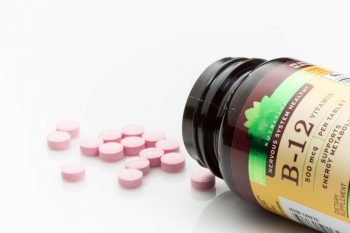By Sayer Ji
Contributing writer for Wake Up World
What’s cyanide doing in vitamin B12 supplements, and is it doing the body any good, or possibly harm?
Unknown to most consumers, cyanide is found in a wide range of vitamins and foods in a form known as cyanocobalamin. Fortunately the cyanide has a very low potential to do harm because it is organically bound to cobalamin (vitamin b12) — that is, as long as everything is working correctly and that person hasn’t already been burdened with environmental chemical exposures from cyanide, and related xenobiotic compunds.
Cyanocobalamin is actually found in 99% of the vitamins on the market which contain B12, as it is relatively cheap (recovered from activated sewage sludge or produced through total chemical synthesis), and stable (non-perishable). Despite its wide usage, it is not an ideal form of vitamin b12, as the cyanide must be removed from the cobalamin before it can perform its biological indispensable roles within the body. While there is plenty of research on the potential value of cyanide-bound vitamin B12, it does have potential to do harm.
In fact, when a person is poisoned with cyanide, as sometimes happens following smoke inhalation, and they are rushed to the emergency room, what do they give them to remove the cyanide? Hydroxocobalamin — a natural form of vitamin b12 — which readily binds with the cyanide, becoming cyanocobalmin. This sequesters the cyanide and puts it into a form ideal for detoxification and elimination, which is then rapidly excreted from the body via the lungs and kidneys.
Those with a higher body burden or higher cyanide exposure, such as smokers, are less likely to be able to effectively detoxify the additional cyanide they consume through their diet or supplements, making the seemingly benign levels found in some vitamins and foods a real problem.
Indeed, this is not the first time the question of the potential toxicity of cyanocobalamin has been raised. As far back as 1992, a report was published in the Journal of the Royal Society of Medicine arguing for its withdrawal from use in vitamin therapy. Another study published in 1997 in the journal Blood, found that cyanocobalamin “antagonizes vitamin B12 in vitro and causes cell death from methionine deficiency.”
Cyanide in non-vitamin form, of course, is extremely toxic and a poster child of sorts, among poisons. It only takes 6.44 mg per kilogram, or 1.61 mg to kill 50% of your average-sized (500 gram) rats through the oral route of exposure. The margin of safety (as defined by the LD50) for cyanocobalamin, on the other hand, is approximately 1,000 times higher.
Interestingly, cyanocobalamin is listed as a hazardous air pollutant (HAP) generally known or suspected to cause serious health problems on the government’s toxicity database known as Toxnet. Moreover, according to Toxnet:
“The Clean Air Act, as amended in 1990, directs EPA to set standards requiring major sources to sharply reduce routine emissions of toxic pollutants. EPA is required to establish and phase in specific performance based standards for all air emission sources that emit one or more of the listed pollutants. Cyanocobalamin is included on this list.”
An entirely different approach to maintaining adequate vitamin B12 levels is through supporting the microflora in the gut, as these beneficial bacteria are proficient in producing this indispensable vitamin. Lactobacillus reuteri, for instance, has been studied for its vitamin B12-producing properties.
Other dietary sources of biologically active B12 include white button mushrooms, spirulina and chlorella. The ideal supplemental form of supplemental vitamin B12 is methylcobalamin, which while more expensive, is capable of absorbing efficiently sublingually and is cell-ready as a methyl donor. It should also be noted that the drug category known as proton pump inhibitors (acid blockers for reflux) prevent vitamin B12 absorption and microwaving food deactivates this vitamin, as well.
Recommended articles by Sayer Ji:
- Brain Regeneration: Why It’s Real and How To Do It
- Research: Garlic is an Effective Natural Treatment for Heart Disease
- Wi-Fi Devices Increase Mercury Release From Dental Amalgams
- Mammography Is Harmful and Should Be Abandoned, Scientific Review Concludes
- “Killer Germs” Obliterated by Medicinal Smoke Smudging, Study Reveals
- Turmeric’s ‘Smart Kill’ Properties Put Chemo & Radiation To Shame
- Beet Juice Boosts Cognitive Function In One Dose
- The Amazing Healing Properties of Apples
- 6 Bodily Tissues That Can Be Regenerated Through Nutrition
- How to Clean Your Arteries With One Simple Fruit
About the author:
Sayer Ji is the founder of Greenmedinfo.com, a reviewer at the International Journal of Human Nutrition and Functional Medicine, Co-founder and CEO of Systome Biomed, Vice Chairman of the Board of the National Health Federation, and Steering Committee Member of the Global Non-GMO Foundation.
For more, visit GreenMedInfo.com and Facebook.com/GreenMedInfo, or sign up for GreenMedInfo’s free e-Newsletter.
© December 12th, 2018 GreenMedInfo LLC. This work is reproduced and distributed with the permission of GreenMedInfo LLC. Want to learn more from GreenMedInfo? Sign up for their newsletter here.

If you've found value in our articles, we invite you to support the release of our brand-new book, "Gratitude Practices for Kids: A Practical Guide for Adults to Instill a Spirit of Appreciation and Positivity in the Next Generation."
"Gratitude Practices for Kids" brings together over 25 innovative and accessible practices designed to enhance gratitude in everyday life. This comprehensive guide is backed by 17 scientific studies, ensuring each concept is grounded in research, underscoring our commitment to nurturing growth, emotional intelligence, and positive interactions between adults and children.
We encourage you to opt for the paperback version to celebrate this new release. Dive into its fresh pages away from digital distractions, allowing you to immerse yourself in the transformative practices it offers.
Over recent years, Wake Up World has faced significant online censorship, which has impacted our financial ability to operate. Moving into book publishing represents a strategic step to secure the ongoing funds needed to continue our mission. By purchasing Gratitude for Kids, you help us keep our content free and accessible to everyone, avoiding needing a paywall. With over 8,500 articles published in the last 13 years, we remain dedicated to keeping our valuable content open to all.









